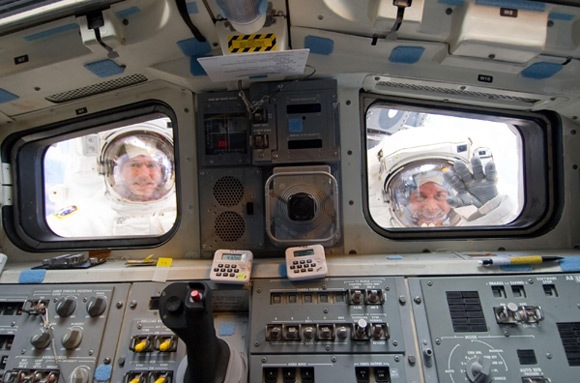The last shuttle mission has flown and, with nothing to replace it, the U.S. manned presence in space has ended with it. The shuttle astronauts in the picture below are the last ones we will ever see.

I’m part of the Apollo generation. The era during which the U.S. was dominant in space, with hundreds of manned missions. The moon landings, Skylab, the shuttle, deployment of Hubble, and the ISS: all of these things marked milestones in my life. The men and women of the space program were, to me, sterling examples of the best humanity has to offer.
The tiny cost of the U.S. space program (the entire 50 year history of which costs less than what the U.S. spends in a single year on the military) has paid off in technological advances worth trillions. And yet, due to the shortsighted and unimaginative nature of current society, it is all over. There are no manned space vehicles being built or maintained by the U.S. after this month. There is a partially designed manned capsule, the Orion, but nothing to launch it with. When Americans want to go into space, they will have to beg the Russians or, perhaps, the Chinese for a ride. Nothing is left other than a vague intent to “one day” go to Mars, but without sufficient funding or a specific plan to do so.
To me, the end of the manned space program marks the end of my youth, and of many of my dreams for mankind. It feels as if the only outcome now is the gradual decay of humanity’s ability and will to go beyond. In a world dominated by petty squabbles over race, religion, and natural resources, the space program was… hope. A dream, I guess, and not a reality.
What is left to inspire us beyond our petty hatreds and cancerous greed? My belief is that it is the dreams that lift us above our animalistic need for territory, wealth, and dominance. The fact that the wealthiest and most powerful nation on Earth has abandoned its greatest and most noble dream tells me that we are failing. A tiny fraction of the hundreds of billions spent every year on destruction could have kept that dream alive, and yet it is over.
I’m hopeful that some fraction of humanity might step up one day to embrace “the other things“. Not because they are easy, but because they are hard…

Actually, this was the last flight of Atlantis. The last Shuttle flight of all will be STS 134 with Endeavour in November.
Other than that I agree with you, while NASA may not have been the “bang for the buck”, humans are explorers and have been ever since we walked out of Africa over a million years ago. Indeed, NASA’s biggest problem the last few decades was that it wasn’t exploring.
People seem to need there to be people going out and filling in the blank spaces on the maps … to “boldly go where no one has gone before.” Even if we can’t go ourselves, we need to see others doing it for us.
But there are no more blank spaces on Earth, not really. Oh there are plenty of things we do not know nor understand, but nothing that appeals to the primitive part of our brain that walks over a hill and sees a new valley. It may not even be noble this need to ‘claim’ new territory; instead it might simply be primitive greed driving us to find new feeding grounds. But it is part of us, and I think like hunger, sex, we deny the imperative to explore at our peril.
Thanks for the correction: it’s Atlantis’ last flight… but I still stand by my rant 😉
I particularly get irritated by ignorant people who prattle away about how expensive NASA is. Even translating for inflation, all 50 years of the space program barely compares to the amount spent on the U.S. military in a *single* year (2010). For 2011, NASA will be allocated between $3.4 and $8.5 billion; for the same year, the Department of Defense will spend $721 billion. To me, that actually goes beyond disturbing, and borders on disgusting…
The problem in the US is that over 1/3 of it’s 3 trillion dollar budget is borrowed money. 1.2 trillion goes towards social security medicare and medicaid … which as we know costs the Americans $1.60 for the same amount of health care our Canadian system would provide. Another half trillion goes to ‘other mandatory spending’ which I take to be transfers to state and local gov’t, and a couple of hundred billion goes to making minimum payments on their debt.
That leaves them with 1 trillion for the ‘real’ budget, and the defense department takes 60 – 70% of that. It’s not just that the defense department dwarfs NASA’s budget, it dwarfs all other US spending.
EVERYONE else in the US government is left fighting over about 300 million. To pat that into perspective the Canadian 2010 budget is 280 billion… 200 if you subtract pension and health and defense.
So a nation of 350 million Americans has only 100 million more to spend than 33 million Canadians.
In short they are bankrupt. It doesn’t make it excusable, but it is more understandable why they look to cut NASA’s budget when you realize they have got to the point that their discretionary spending is on par with a country 1/10 their size.